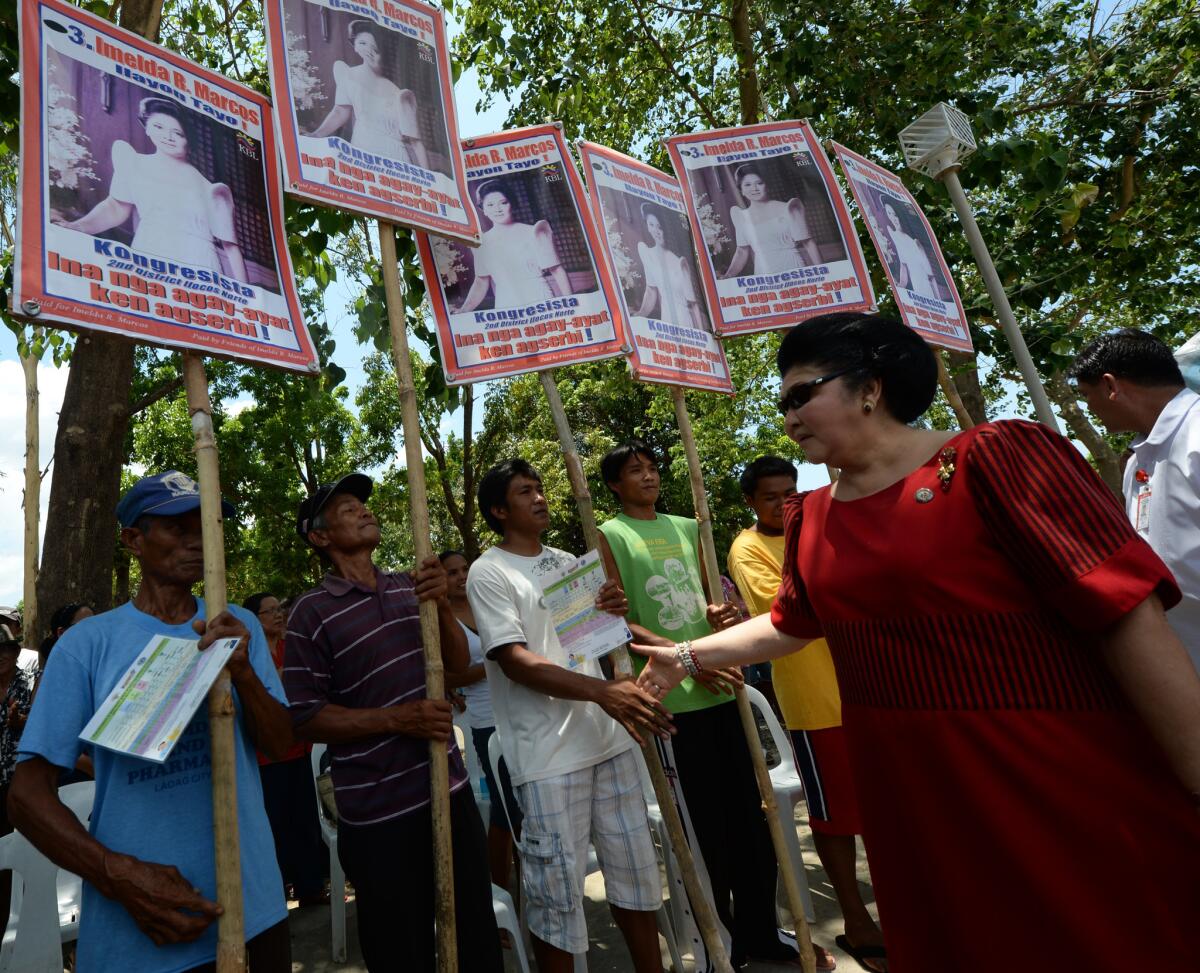The Week Ahead: Imeldaâs back, Iran at impasse, Syria in turmoil

Marcos dynasty enhancing its political comeback in the Philippines
Monday, May 13 -- Unrepentant over her role as treasure-squandering first lady, the widow of late Philippine dictator Ferdinand Marcos is poised for victory in Mondayâs congressional elections to represent the Marcos family stronghold of Ilocos Norte province.
Imelda Marcos campaigned for reelection in ball gowns and jewels, visiting impoverished towns and villages in a flashy entourage that seems to have stirred little resentment over the countryâs gaping social divide.
The Marcos familyâs return to positions of power has been gaining momentum in recent years: Daughter Imee is governor of Ilocos Norte and son Ferdinand âBongbongâ Jr. has held a seat in the upper house of Congress since 2010.
That a family so reviled as to have spurred revolution has staged such a dramatic comeback may be explained by tradition and the passage of time more than political amnesia. With a median age of 23 among its 106 million population, the majority of Filipinos have no memory of the rampant human rights violations committed by Marcos during more than two decades as president.
Nor do most Filipinos have personal memories of Marcosâ role in the 1983 assassination of Benigno Aquino Jr., the current presidentâs father. The political slaying set off the People Power revolution three years later that toppled Marcos and sent him into U.S. exile. Marcosâ widow and children were allowed to return to the Philippines in 1991, two years after the dictatorâs death in Hawaii.
Political dynasties were outlawed by the 1987 constitution drafted after Corazon Aquino became the countryâs first female president on a wave of sentiment for her slain husband. But entrenched political influence among elite Filipino clans has frustrated efforts among reformers to draft laws defining what constitutes excessive power vested in one family and regulations to thwart it.
That has left the door open for Bongbong to make a bid for the presidency in 2016, an ambition Imelda Marcos hailed on the campaign trail, predicting that her son would be, âlike his father, a great president.â
Different table, same stalled talks on Iranâs nuclear ambitions
Wednesday, May 15 â- Unwilling to take no for an answer, the European Unionâs top diplomat will meet with Iranâs chief nuclear negotiator in Istanbul in a renewed effort to persuade Tehran to continue negotiating with the worldâs major powers on its nuclear development plans.
The Iranian government has insisted in each of five gatherings of the so-called P5-plus-1 forum that it has a right to enrich uranium for peaceful purposes and will continue to do so despite the other countriesâ objections. Some Western leaders fear that Tehran, though technically within the confines of the Nuclear Nonproliferation Treaty, has stockpiled enough uranium enriched to 20% purity that it could easily convert it to weapons-grade quality and produce nuclear bombs within a few months.
The dispute over Iranâs enrichment activity has caused the five previous meetings with the five permanent members of the U.N. Security Council â- the United States, Russia, China, Britain and France -- plus Germany to adjourn without having made headway toward a compromise.
With more than a month passing since the last talks on April 6 in Kazakhstan, European Union foreign policy chief Catherine Ashton last week announced that she would meet in the Turkish city with Iranâs Saeed Jalili to determine whether there are grounds for calling another session with the six powers.
Iran is in the throes of a volatile election campaign, with dozens of candidates vying to succeed President Mahmoud Ahmadinejad, who is barred from seeking a third consecutive term.
That has made the uranium enrichment issue a political football on the campaign trail, leading analysts to conclude that little will change in Tehranâs posture toward the P5-plus-1 forum, at least not before the next president is decided in June 14 balloting.
Obama talks with Turkish premier to spotlight Syrian dilemma
Thursday, May 16 -- Syria and how to end its bloody civil war are the subjects expected to dominate Turkish Prime Minister Recep Tayyip Erdoganâs meeting with President Obama in the White House.
Unlike Obama administration officials who are hesitant to escalate U.S. involvement in the conflict, Erdogan has unequivocally called for arming Syrian rebels in their battle to oust President Bashar Assad. Erdogan has said he would support a NATO-backed âno-flyâ zone over Syria to ground Assadâs warplanes. He also wants safe zones established within the war-racked country to staunch the flow of refugees into already-inundated neighboring states.
Turkish Foreign Minister Ahmet Davutoglu said in Ankara last week that the government had proof that Assadâs forces had used chemical weapons against Syrian civilians, a step Obama has said would cross âa red lineâ and invite harsher action against Damascus. Davutoglu said the evidence was being obtained through blood tests on Syrian refugees arriving in Turkey after purported exposure to sarin nerve gas.
Much has changed for Turkey since Erdogan last visited Washington in December 2009. In addition to the Syrian war that has sent half a million refugees into Turkey, neighboring Iraq is again in the grip of sectarian violence, and Iranâs nuclear developments are proceeding unchecked.
Middle East analysts deem the Erdogan visit with Obama of historical importance at a time when the region is roiled by democratic rebellion and religious strife. But they also caution against exaggerated expectations of progress in the complex diplomatic and security challenges confronting Washington and Ankara.
ALSO:
High-ranking Chinese official caught in anti-corruption net
Israelis worried that U.N. may quit patrolling Syrian border
Pakistanâs Sharif: Seasoned leader is seen as soft on extremists
More to Read
Sign up for Essential California
The most important California stories and recommendations in your inbox every morning.
You may occasionally receive promotional content from the Los Angeles Times.









